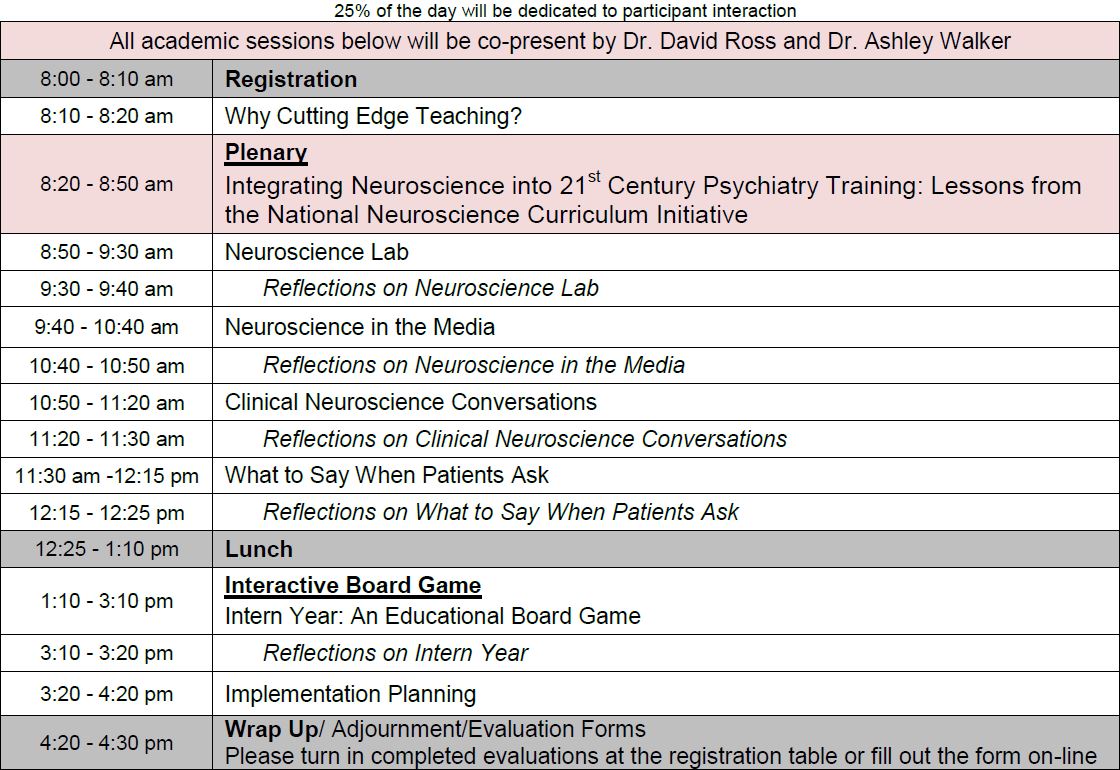2020 Neuroscience Conference
Cutting Edge Neuroscience Deserves Cutting Edge Teaching
PLEASE NOTE THAT THIS EVENT HAS BEEN POSTPONED UNTIL FURTHER NOTICE.
Best Western, Lamplighter Inn
591 Wellington Rd, London, ON N6C 4R3
“Free Parking”
Food will be provided for the day

Overall Learning Objectives
At the conclusion of this event, participants will be able to:
- Recognize the relevance of cutting-edge neuroscience to the future of psychiatry;
- Describe principles of adult learning as relevant to graduate medical education;
- Implement different approaches for integrating neuroscience education into classroom teaching, clinical settings, and for self-study use.
Presentations
|
Objectives
|
All academic sessions below will be co-presented by Dr. David Ross and Dr. Ashley Walker
|
Plenary
Integrating Neuroscience into 21st Century Psychiatry Training: Lessons from the National Neuroscience Curriculum Initiative
|
- Appreciate the relevance of cutting-edge neuroscience to the future of psychiatry;
- Appreciate historical limitations to effectively incorporating neuroscience into psychiatry;
- Be able to describe different approaches for integrating neuroscience education into classroom teaching, clinical settings, and for self-study use.
|
Neuroscience Lab
|
- Describe a basic conceptual framework for the underlying neurobiology of psychiatric illnesses;
- Recognize the centrality of neuroscience to the future of psychiatry and the relevance of ongoing research in the care of psychiatric patients;
- Articulate how a neuroscience perspective can help formulate psychiatric cases and inform treatment options.
|
Neuroscience in the Media
|
- Critique media coverage of issues relevant to psychiatry;
- Find and appraise relevant scientific literature;
- Communicate thoughtfully with a lay audience;
- Complete this exercise for other media articles on their own as part of life-long learning.
|
Clinical Neuroscience Conversations
|
- Recognize the relevance of ongoing neuroscience to clinical care;
- Demonstrate the ability to integrate specific neuroscience content into a comprehensive case formulation and treatment plan;
- Be inspired to read core neuroscience articles/resources on their own as part of their life-long learning.
|
What to Say When Patients Ask
|
- Recognize the relevance of ongoing neuroscience work to clinical care;
- Incorporate neuroscience perspectives into each patient encounter;
- Incorporate neuroscience perspectives into their teaching.
|
Interactive Board Game
Intern Year: An Educational Board Game
During the board game participants explore how different events on call, on rotations, in clinics affect their sleep, behaviors and well-being. The game is arranged so that through a roll of the dice, different scenarios arise. What is unique about this game is that it fosters deep discussion about experiences physicians (trainees and faculty) face and the impact it has had on them. This is done in a safe and fun setting.
|
Board Game learning objectives
- Participants will be able to engage with peers regarding the rewards and stresses of being a psychiatrist.
- The participant will be able to discuss work-related issues that can effect their sense of well-being.
|

This event is an Accredited Group Learning Activity (Section 1) as defined by the Maintenance of Certification Program of the Royal College of Physicians and Surgeons of Canada, and approved by Continuing Professional Development, Schulich School of Medicine & Dentistry, Western University. You may claim a maximum of 7.75 hours (credits are automatically calculated).
Each participant should claim only those hours of credit that he/she actually spent participating in the educational program.










